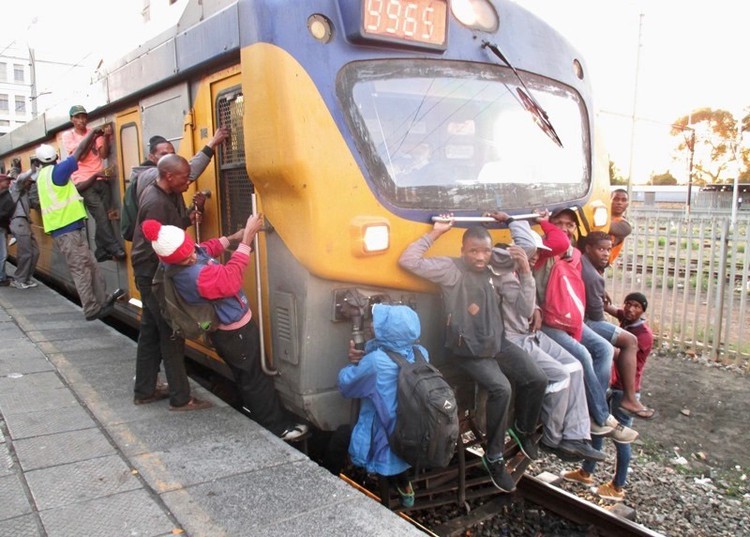Treasury covering up grand-scale corruption at PRASA
Deputy Finance Minister Sfiso Buthelezi and former CEO Lucky Montana implicated over and over again
For almost a year, National Treasury has kept the lid on almost 200 investigations into PRASA contracts which show that up to R2.5 billion was siphoned off in contracts which should never have been signed.
The investigations, into contracts worth R10 million or more, were ordered by former Public Protector Thuli Madonsela following her 2015 report on mismanagement at PRASA. The Treasury parcelled them out to 13 different auditing and legal firms.
The documents, given to GroundUp by the UniteBehind Coalition, paint a picture of incompetence, corruption and mismanagement on a grand scale.
There are more red flags in the 1,000-odd pages of reports than at a Moscow May Day parade.
Page after page the reports detail contraventions of PRASA’s own Supply Management Policy and the Public Finance Management Act, irregularities in procurement, improper constitution of Bid Evaluation Committees, irregular expenditure and absence of proper documentation from PRASA. The names of Lucky Montana, then chief executive, chief procurement officer Dr Joseph Phungula, and head of security Kabelo Mantsane crop up again and again.
Also mentioned is Deputy of Minister of Finance Sfiso Buthelezi, then chair of the board. Frequently the board is found to have been derelict in its duty. GroundUp emailed Buthelezi for comment but received a response that he is out of the country.
In one in five cases (39 out of 193) the investigators recommend that criminal proceedings be launched.
The auditors list companies owned by a single person benefitting from tens of millions of rands, forged signatures, rigged tender awards, bid committee meetings where all the members somehow gave the bidders identical scores, contracts awarded without quotes from the companies, and contracts awarded to companies apparently created just to get the contract.
At least one company was awarded a contract even though its managers had not attended the compulsory briefing session.
Security companies were paid millions to guard stations and vital equipment, and safeguard commuters, yet continually extended contracts are riddled with irregularities. One security company was not even registered with the Private Security Industry Regulatory Authority.
In many cases the auditors note that because of the time lapse between the contract and their investigation they have not been able to check whether the work was done properly or at all.
Of the investigations into 193 contracts worth over R10 million that PRASA entered into between 2012 and 2016, only eight got the all clear from the auditors. In the R9.1 billion paid to contractors, the investigators found irregular expenditure of up to R2.5 billion, if money in all the contracts labelled irregular is included.
Lindikhaya Zide, acting group CEO, who was company secretary during the period, did not respond to an invitation from GroundUp to comment. The Treasury did not respond to questions about why the reports had not been released.
Among the investigators’ findings are:
-
Montana was responsible for the irregular and unconstitutional appointment of Lufthansa Consulting in a R15 million contract to turn around the Shosholoza Meyl operation. Like many others, this contract was signed as a “confinement” - a procedure which allows PRASA to deviate from competitive bidding rules under certain circumstances such as emergencies. The auditors found no justification for this and recommended the matter be reported to the police for criminal investigation.
-
Construction company Superway was awarded a R105 million contract although the budget for this had not been approved, and without submitting the required Construction Industry Development Board grading certificates, a factor which disqualified two other bidders. Scoring sheets at the bid evaluation committee level were incomplete and the recommendation was not signed.
-
An R11 million construction contract to Steverob Investments was also awarded without a Construction Industry Development Board certificate and despite a competitor getting a better score.
-
A R22.6 million contract to clear vegetation in KwaZulu-Natal was awarded to a company called SN Projects, which described itself as “black woman owned” but had only one shareholder, a Mr Phakamile Fesi. The company was based in Klerksdorp.
In this glaring irregularity, Fesi received R1.9m from PRASA for one and a half months of work, charged at R6.60 per square metre of vegetation control. Comparative schedules obtained by Bowmans from PRASA Kwazulu-Natal offices show the market rate was between R0.15 and R0.22 per square metre.
This contract was signed as a “confinement” process by Montana and his network, until it was stopped in December 2015.
Montana and Phungula were involved in all the deviations investigated by Deloitte. The firm said: “In our view, both Mr Montana and Dr Phungula’s actions (specifically to appoint Lufthansa) constituted a breach of their duty to act diligently and in the best interests of PRASA. In our view, both Mr Montana and Dr Phungula acted negligently.”
All in all, the reports reveal the cavalier mismanagement of public funds supposed to be spent on ensuring that the two million South Africans who daily rely on PRASA are able to commute safely and on time.
It is clear why our train services are in such dire straits. In fact, it’s a miracle they run at all.
UPDATE 12:30, 29 November:
GroundUp unsuccessfully attempted to contact Montana on Tuesday before publication. Following publication, Montana criticised the article on Twitter. He described the forensic reports as “poor”. He wrote: “I assume [Treasury] has authorised GroundUp to publish draft reports that Treasury itself has not finalised.”
See also: Scorpio: Prasa – Treasury investigation recommends Sfiso Buthelezi be criminally charged
Support independent journalism
Donate using Payfast

Next: Court hears black communities get inferior police services
Previous: Day 11: Court hears of witness to Michael Komape’s death
© 2017 GroundUp. 
This article is licensed under a Creative Commons Attribution-NoDerivatives 4.0 International License.
You may republish this article, so long as you credit the authors and GroundUp, and do not change the text. Please include a link back to the original article.

